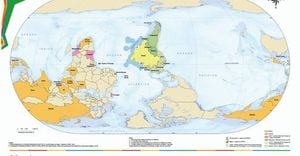In 2025, the Romanian government is launching the Euro 200 Program to assist students from low-income families in acquiring computers. This initiative offers financial aid of 200 euros to students aged up to 26 years, whether they are enrolled in state or accredited private educational institutions. The program aims to enhance digital skills among youth and ensure that they have the necessary tools for their education.
Applications for the Euro 200 Program must be submitted by May 16, 2025, at the latest. Eligibility for this financial aid is determined by family income, specifically targeting families with a gross monthly income of no more than 500 lei per family member. This year marks a significant increase in the income threshold from the previous 250 lei, reflecting the rising cost of living.
The timeline for the Euro 200 Program is clearly defined. Following the application deadline on May 16, social investigations will be conducted from May 17 to June 27, 2025. Provisional lists of beneficiaries will be displayed on June 27, allowing for an appeal period from June 28 to July 25. The final lists of beneficiaries will be published on July 25, 2025.
To apply for the financial aid, families must compile a comprehensive set of documents. This includes a standard application form, a copy of the student’s birth certificate or ID, the parent’s ID, and any relevant documents proving guardianship if applicable. Additional requirements include copies of IDs or birth certificates for other family members, certificates confirming the student status of siblings, proof of income, and declarations regarding income and price differences. For students in higher education, a certificate showing at least 45 credits is also necessary.
Moreover, the computer purchased with this aid must meet specific minimum technical requirements. For desktop computers, a minimum processor speed of 3.0 GHz is required, along with a hard drive of at least 500 GB or an SSD of 240 GB, and a minimum of 8 GB RAM. The monitor should be at least 18.5 inches with a resolution of 1920 x 1080. For laptops, the specifications are slightly different, requiring at least a dual-core processor, similar hard drive specifications, and a minimum screen size of 14 inches with a resolution of 1366 x 768.
Beneficiaries will receive a voucher that can be used at any authorized computer retailer. If the cost of the computer exceeds the voucher amount, the difference must be covered by the beneficiary. Additionally, the retailer is required to issue a receipt indicating that the 200 euros will be paid by the educational institution, along with a warranty certificate valid for a minimum of 24 months.
In parallel, disadvantaged families in Chișinău are also receiving support as they prepare for the upcoming 2025-2026 school year. The municipal authorities have announced that parents or legal guardians can apply for unique material aid to help cover the costs associated with getting their children ready for school. This assistance is specifically targeted at students in grades II-IX and XI-XII.
The deadline for submitting applications for this aid is June 4, 2025. School directors have been urged to promptly inform parents about this opportunity, ensuring that families are aware of the available support. For students in grades I, V, and X, lists of potential beneficiaries will be collected and submitted in September 2025, after the enrollment process is finalized.
Each educational institution will communicate the necessary documentation required for application, as outlined by the General Directorate of Education, Youth, and Sports. The financial support provided by the Chișinău City Hall is based on a regulation adopted by the Municipal Council in 2018, aimed at supporting children from vulnerable families.
Collecting personal information for these applications necessitates strict adherence to confidentiality and data protection laws. Authorities emphasize the importance of treating collected data responsibly, ensuring that privacy is maintained throughout the application process.
As the Euro 200 Program and the material aid initiative in Chișinău unfold, they represent significant steps toward supporting education and digital access for disadvantaged families. These efforts highlight the ongoing commitment of local and national authorities to enhance educational opportunities for all students, regardless of their economic background.




